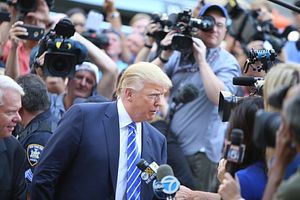Republican presidential hopeful Donald Trump has reiterated his willingness to meet North Korean leader Kim Jong-un personally, once again blurring traditional partisan and ideological lines in American policy toward Pyongyang.
Addressing a campaign event in Atlanta, Georgia on Wednesday, Trump said he’d talk directly to the supreme leader of North Korea about nuclear disarmament, but only on American soil.
“I’ll speak to anybody. Who knows?” Trump was quoted as telling his supporters. “There’s a 10 percent or a 20 percent chance that I can talk him out of those damn nukes because who the hell wants him to have nukes? And there’s a chance — I’m only gonna make a good deal for us.”
Trump’s stance is unusual for creating a situation in which the Republican candidate has a more dovish policy on North Korea than both his Democratic rival and the current Democratic president.
Former Secretary of State Hillary Clinton previously pointed to a similar suggestion from Trump last month as an example of how he was unqualified to be president. President Barack Obama, meanwhile, has spurned talks with North Korea until Pyongyang demonstrates willingness to denuclearize, a wait-and-see approach his administration has dubbed “strategic patience.”
As a presidential candidate, however, Obama took a near-identical position to that of Trump. During the Democratic nomination race in 2007, then-Senator Obama was attacked as “naive” by Clinton for indicating he’d meet late North Korean leader Kim Jong-il and other dictators without preconditions, a charge repeated by the Republican runner John McCain during the general election.
This time around, the Republican candidate has positioned himself to the left of everyone else on the stage.
“Trump is erratic and all over the place. So it’s hard if not impossible for me to make any sense of what he says,” Daniel Pinkston, a lecturer in international relations at Troy University and former Korean linguist in the U.S. Air Force, told The Diplomat. “The best I can come up with is that Trump is an extreme narcissist.”
Pinkston said the current hands-off approach toward Pyongyang was unlikely to change in the foreseeable future and the value of any talks would depend on the likelihood of results.
“I don’t care about anyone meeting anyone except for how it affects outcomes,” he said. “What’s the expected outcome? It turns on the outcome.”
In other quarters, the reception to Trump’s comments was warmer — even amid skepticism that he’d be able to make anything useful out of dialogue.
“I think there’s a real danger here that we throw out the baby in the bathwater,” said John Delury, an associate professor at Yonsei University in Seoul and a prominent voice for engagement.
“Trump is the bathwater; he is not who we would want as president getting into serious negotiations with North Korea. However, his premise is correct: that the United States has failed to move the ball for eight years under the Obama approach and the next president is going to have to reopen a serious diplomatic negotiation.”
While Trump’s comments were as likely sparked by an instinct for spectacle as thoughtful deliberation, according to Delury, his antidote could be effective in the right hands — specifically those of his rival for the presidency.
Delury said the former secretary’s diplomatic overtures toward hostile nations such as Cuba, Myanmar and Iran, as well as President Bill Clinton’s negotiations with Pyongyang during the 1990s, could serve as a template for a Clinton presidency.
“So I’m hoping Hilary Clinton is staking out a hardline position now in the campaign but will move to a wiser approach once she actually takes office,” he said. “It would be the opposite of Obama.”

































